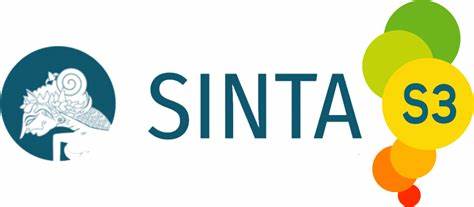(THE RETRACTION REQUESTED BY THE AUTHOR) CLIL-ORIENTED AND TASK-BASED EFL MATERIALS DEVELOPMENT
DOI:
https://doi.org/10.22460/eltin.v8i1.p10-25Keywords:
materials development, CLIL, task-based approachAbstract
This Research & Development (R&D) aims at developing materials in the form of a coursebook prototype for the tenth-grade students of senior high schools in Indonesia. Teacher interviews and students questionnaire were used to assess the users’ needs. The data revealed that the existing materials are not relevant to the students’ needs majored in studying Math and Science (Biology, Chemistry, Physics). So there is a need for developing new materials by orienting to quality CLIL materials principles and task-based approach. In general, based on the validation checklists, the materials were considered reliable by the English teachers, the EFL material and language expert and the media expert. The final product was also considered acceptable by the students and teachers based on the questionnaires distributed after the limited-field tryout. The study resulted in three main products: Student Book, Teacher’s Guide, and Listening Audio CD.
References
Anderson, L. W, Krathwohl, D.R., Bloom. B. (2001). A Taxonomy for Learning, Teaching and Assessing: A Revision of Bloom's Taxonomy of Educational Objectives. New York: Longman
Banegas. D. L. (2013). Three Frameworks for Developing CLIL Materials. University of Warwick and Argentina
Bravos, K. (2010). Readability tests and formulas. Retrieved from http://www.ideosity.com/ 2010/01/14/readability-tests-and-formulas
Brown. H. D. (2007). Teaching by Principles: An Interactive Approach to Language Pedagogy (3rd ed.). NY: Pearson Education Inc.
Coyle, D., Hood, P., & Marsh, D. (2010). CLIL: Content and Language Integrated Learning. Cambridge: Cambridge University Press.
Cummins, J. (2000). BICS and CALP: clarifying the distinction. ERIC retrieved http://files.eric.ed.gov/fulltext/ED438551.pdf on December 15, 2015.
Ellis, R. 2003. Task-Based Language Learning and Teaching. Oxford, U.K.: Oxford University Press.
Ellis, R. 2009. Task-based language teaching sorting out the misunderstandings. International Journal of Applied Linguistics, 19(3), 221-246.
Gall, M.D., Gall, J.P., & Borg, W.R. (2003). Educational Research: An Introduction (7th ed.). New York: Longman Inc.
GarcÃa. S. 2013. Three frameworks for developing CLIL materials in infant and primary education. Encuentro 22, 2013, ISSN 1989-0796, pp. 49-53
Gray, J. (2010). The branding of English and the culture of the new capitalism: Representations of the world of work in English language textbooks. Applied Linguistics, 31(5), 714-733.
Harmer, J. (2007). The Practice of English Language Teaching (4th ed.). England: Pearson Education Limited.
Ikeda, M. (2013). Does CLIL work for Japanese secondary school students?: Potential for the ‘weak’ version of CLIL. International CLIL Research Journal, 2(1), 31-43. Retrieved from http://www.icrj.eu/21/article3.html
Lee, W.W. & Owens, D.L. (2004). Multimedia-Based Instructional Design (2nd ed.). San Fransisco: John Wiley & Sons Inc.
Mehisto, P., Marsh, D., & Frigols, M. (2008). Uncovering CLIL: Content and language integrated learning in bilingual and multilingual education. Oxford: Macmillan.
Moore, P. & Lorenzo, F. (2015).Task-based learning and content and language integrated learning materials design: process and product, The Language Learning Journal, 43:3, 334-357, DOI: 10.1080/09571736.2015.1053282
Nunan, D. (2004). Task-Based Language Teaching. Cambridge: Cambridge University Press.
Oughton, H. (2007). Constructing the 'ideal learner': a critical discourse analysis of the adult numeracy core curriculum.†Research in Post-Compulsory Education 12 (2): 259‒275. http://dx.doi.org/10.1080/13596740701387536
Sasajima, S. (2013). How CLIL can impact on EFL teachers’ mindsets about teaching and learning: An exploratory study on teacher cognition. International CLIL Research Journal, 2(1), 55-66. Retrieved from http://www.icrj.eu/21/article5.html
Schlegel, M.J. (1995). A handbook of instructional and training program. Educational Resource Information Center (ERIC) http://www.eric.ed.gov/%3Fid%3DED383381 retrieved November 13, 2015
Sherman, J. E. (2010). Multiple levels of cultural bias in TESOL course books. RELC Journal, 41(3), 267-281.
Tomlinson, B. (2012). Materials Development for Language Learning and Teaching. Cambridge: Cambridge University Press.
Van den Branden, K. (2006). Task-Based Language Education: From Theory to Practice. Cambridge: Cambridge University Press.
Willis, J. (2006). A Framework for Task-based Learning. London: Longman.
Yoshihara, R. (2011). Learning and teaching gender and sexuality issues in the EFL classroom: Where students and teachers stand. Journal and Proceedings of the Gender Awareness in Language Education, 4, 5-21.





